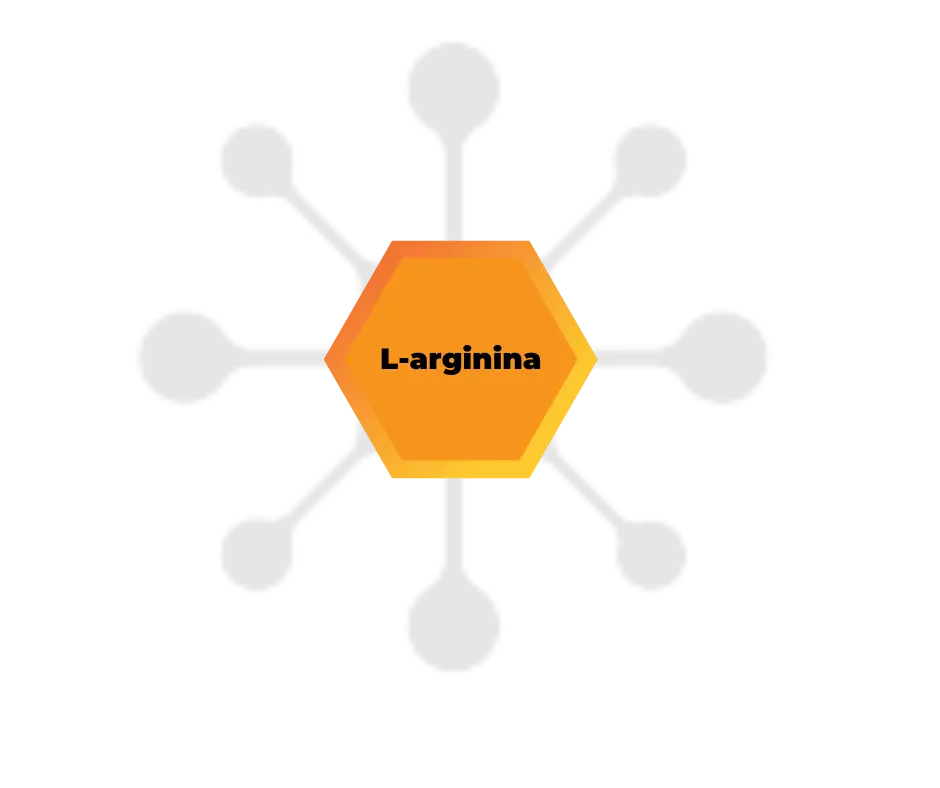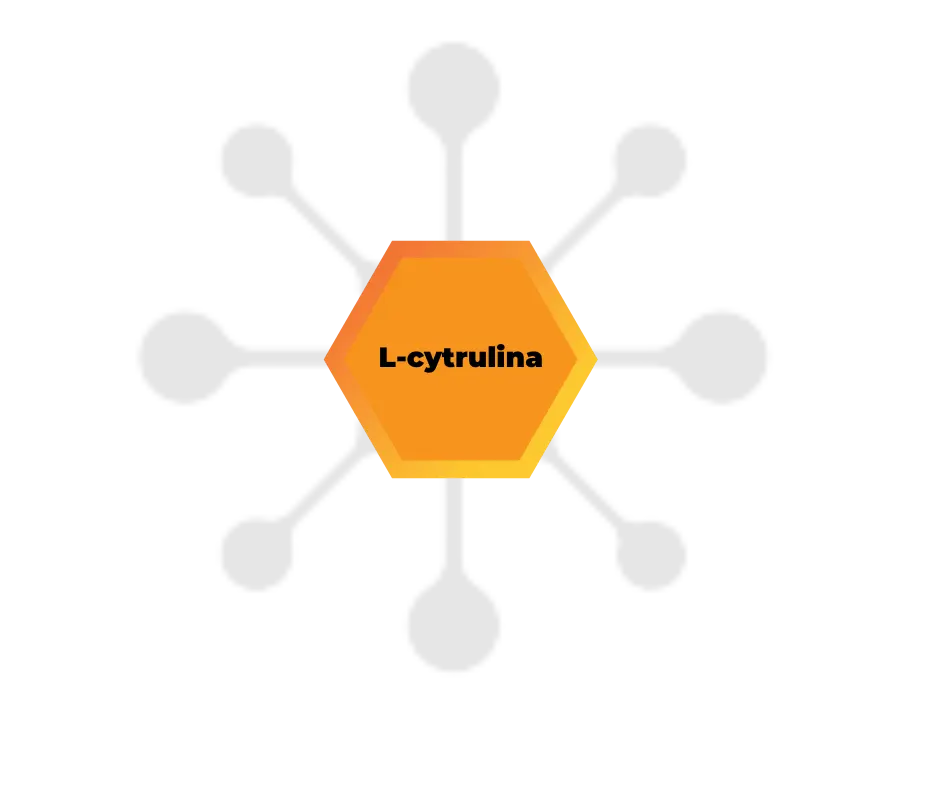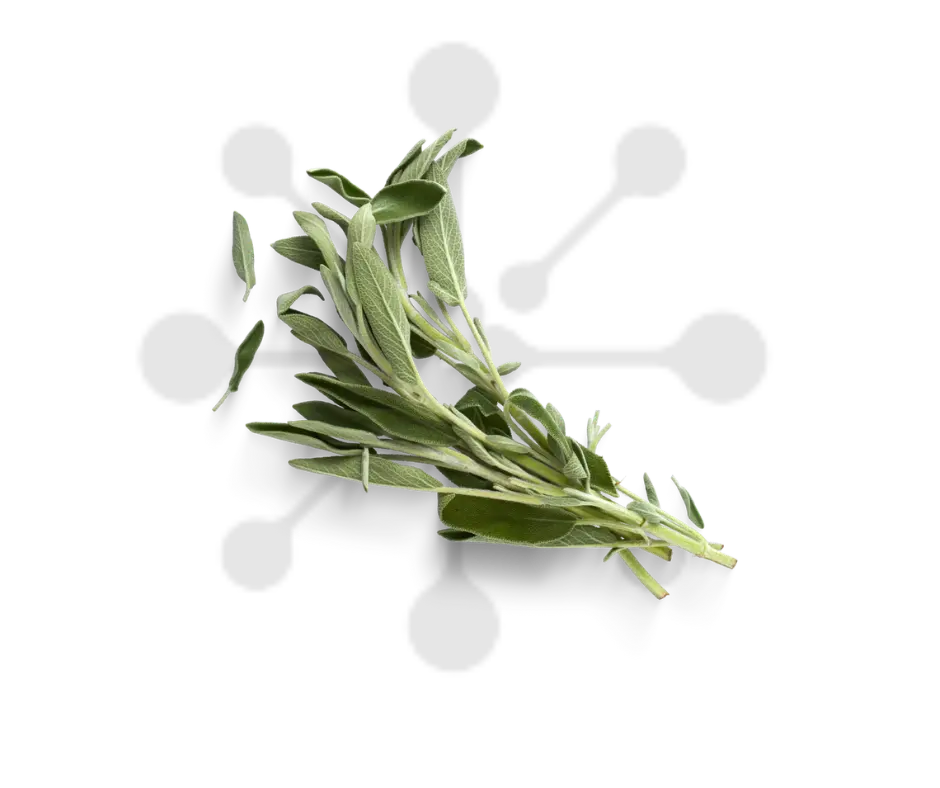What the scientific world says about ingredients
STEEL DURANCE is mainly a product dedicated to athletes of endurance sports, whose main goal is to maximize endurance and aerobic capacity. However, also those who practice sports with other characteristics can strongly improve their performance.
The main goal of STEEL DURANCE is to produce and utilize, as best as possible, nitric oxide, whose most well-known and remarkable function, in the context of sports physiology, is its role in controlling vasodilation. This leads to improved transport of blood, oxygen and a role in mitochondrial respiration, thereby enhancing training capacity and performance (1).

ARGININA
It is an amino acid that participates in the synthesis and bioavailability of nitric oxide (NO). As a result, it exhibits a vasodilatory effect, facilitating the flow of blood and thus oxygen and nutrients to working muscles (2,3).

CITRULINE
Citrulline is an amino acid that promotes nitric oxide (NO) synthesis. Thus, like arginine, it can contribute to vasodilation, improving blood flow and the delivery of oxygen and nutrients to working muscles. As a result, it can increase aerobic endurance and physical performance, which is particularly beneficial in endurance sports. Studies show that citrulline supplementation can increase ATP levels in muscles, resulting in better performance during prolonged and intense workouts (33).

RED SPINACH
It is a plant with high nutritional value that can provide numerous benefits to athletes. The plant is rich in numerous bioactive compounds, such as flavonoids and betalains, which exhibit antioxidant activity (34). Thanks to its high nitrate content, red spinach can improve blood flow and muscle oxygenation, which contributes to better physical performance. Nitrates are converted in the body to nitric oxide (NO), which dilates blood vessels, increasing the delivery of oxygen and nutrients to working muscles.

SLAVIA
Sage (Salvia officinalis L.) is a medicinal plant that has a number of properties that can support athletes. It contains numerous bioactive compounds, such as flavonoids, terpenoids and phenolic acids, which exhibit anti-inflammatory and antioxidant effects. Studies on athletes indicate that sage improves cognitive function (working memory, reaction time and less feeling of fatigue and exertion). The positive effects were obtained in the pre-exercise state and persisted even with fatigue (29). The action of improving memory and concentration occurs by inhibiting acetylcholinesterase, an enzyme that breaks down the neurotransmitter acetylcholine (30,31).
BIBLIOGRAPHY
- Oral O. Nitric oxide and its role in exercise physiology. J Sports Med Phys Fitness. 2021 Sep;61(9):1208-11.
- Kerksick CM, Wilborn CD, Roberts MD, Smith-Ryan A, Kleiner SM, Jäger R, et al. ISSN exercise & sports nutrition review update: research & recommendations. J Int Soc Sports Nutr. 2018 Aug;15(1):38.
- Wu G, Morris SMJ. Arginine metabolism: nitric oxide and beyond. Biochem J. 1998 Nov;336 ( Pt 1(Pt 1):1-17.
- Schaefer A, Piquard F, Geny B, Doutreleau S, Lampert E, Mettauer B, et al. L-arginine reduces exercise-induced increase in plasma lactate and ammonia. Int J Sports Med. 2002 Aug;23(6):403-7.
- Tsai P-H, Tang T-K, Juang C-L, Chen KW-C, Chi C-A, Hsu M-C. Effects of arginine supplementation on post-exercise metabolic responses. Chin J Physiol. 2009 Jun;52(3):136-42.
- Forbes SC, Harber V, Bell GJ. The acute effects of L-arginine on hormonal and metabolic responses during submaximal exercise in trained cyclists. Int J Sport Nutr Exerc Metab. 2013 Aug;23(4):369-77.
- Huerta Ojeda Á, Domínguez de Hanna A, Barahona-Fuentes G. [The effect of supplementation with L-arginine and L-citrulline on physical performance: a systematic review]. Nutr Hosp. 2019 Dec;36(6):1389-402.
- Pahlavani N, Entezari MH, Nasiri M, Miri A, Rezaie M, Bagheri-Bidakhavidi M, et al. The effect of l-arginine supplementation on body composition and performance in male athletes: a double-blinded randomized clinical trial. Eur J Clin Nutr. 2017 Apr;71(4):544-8.
- Bailey SJ, Winyard PG, Vanhatalo A, Blackwell JR, DiMenna FJ, Wilkerson DP, et al. Acute L-arginine supplementation reduces the O2 cost of moderate-intensity exercise and enhances high-intensity exercise tolerance. J Appl Physiol. 2010 Nov;109(5):1394-403.
- Knowles RG, Moncada S. Nitric oxide synthases in mammals. Biochem J. 1994 Mar;298 ( Pt 2(Pt 2):249-58.
- Durante W, Johnson FK, Johnson RA. Arginase: a critical regulator of nitric oxide synthesis and vascular function. Clin Exp Pharmacol Physiol. 2007 Sep;34(9):906-11.
- McRae MP. Therapeutic Benefits of l-Arginine: An Umbrella Review of Meta-analyses. J Chiropr Med. 2016 Sep;15(3):184-9.
- Sureda A, Pons A. Arginine and citrulline supplementation in sports and exercise: ergogenic nutrients? Med Sport Sci. 2012;59:18-28.
- Schmidt HH, Nau H, Wittfoht W, Gerlach J, Prescher KE, Klein MM, et al. Arginine is a physiological precursor of endothelium-derived nitric oxide. Eur J Pharmacol. 1988 Sep;154(2):213-6.
- Schwedhelm E, Maas R, Freese R, Jung D, Lukacs Z, Jambrecina A, et al. Pharmacokinetic and pharmacodynamic properties of oral L-citrulline and L-arginine: impact on nitric oxide metabolism. Br J Clin Pharmacol. 2008 Jan;65(1):51-9.
- Benjamin N, O'Driscoll F, Dougall H, Duncan C, Smith L, Golden M, et al. Stomach NO synthesis. Vol. 368, Nature. England; 1994. p. 502.
- Lundberg JO, Weitzberg E, Lundberg JM, Alving K. Intragastric nitric oxide production in humans: measurements in expelled air. Gut. 1994 Nov;35(11):1543-6.
- Lundberg JO, Weitzberg E, Gladwin MT. The nitrate-nitrite-nitric oxide pathway in physiology and therapeutics. Nat Rev Drug Discov [Internet]. 2008;7(2):156-67. Available from: https://doi.org/10.1038/nrd2466
- Wylie LJ, Bailey SJ, Kelly J, Blackwell JR, Vanhatalo A, Jones AM. Influence of beetroot juice supplementation on intermittent exercise performance. Eur J Appl Physiol [Internet]. 2016;116(2):415-25. Available from: https://doi.org/10.1007/s00421-015-3296-4
- Thompson C, Vanhatalo A, Jell H, Fulford J, Carter J, Nyman L, et al. Dietary nitrate supplementation improves sprint and high-intensity intermittent running performance. Nitric Oxide [Internet]. 2016;61:55-61. Available from: https://www.sciencedirect.com/science/article/pii/S1089860316301185
- Thompson C, Wylie LJ, Fulford J, Kelly J, Black MI, McDonagh STJ, et al. Dietary nitrate improves sprint performance and cognitive function during prolonged intermittent exercise. Eur J Appl Physiol. 2015 Sep;115(9):1825-34.
- Wylie LJ, Kelly J, Bailey SJ, Blackwell JR, Skiba PF, Winyard PG, et al. Beetroot juice and exercise: pharmacodynamic and dose-response relationships. J Appl Physiol. 2013 Aug;115(3):325-36.
- Maughan RJ, Burke LM, Dvorak J, Larson-Meyer DE, Peeling P, Phillips SM, et al. IOC consensus statement: dietary supplements and the high-performance athlete. Br J Sports Med [Internet]. 2018 Apr 1;52(7):439 LP - 455. Available from: http://bjsm.bmj.com/content/52/7/439.abstract
- Rokkedal-Lausch T, Franch J, Poulsen MK, Thomsen LP, Weitzberg E, Kamavuako EN, et al. Chronic high-dose beetroot juice supplementation improves time trial performance of well-trained cyclists in normoxia and hypoxia. Nitric oxide Biol Chem. 2019 Apr;85:44-52.
- Gallardo EJ, Coggan AR. What Is in Your Beet Juice? Nitrate and Nitrite Content of Beet Juice Products Marketed to Athletes. Int J Sport Nutr Exerc Metab [Internet]. 2019;29(4):345-9. Available from: https://journals.humankinetics.com/view/journals/ijsnem/29/4/article-p345.xml
- Subramanian D, Gupta S. Pharmacokinetic study of amaranth extract in healthy humans: A randomized trial. Nutrition. 2016;32(7-8):748-53.
- Gonzalez AM, Accetta MR, Spitz RW, Mangine GT, Ghigiarelli JJ, Sell KM. Red Spinach Extract Supplementation Improves Cycle Time Trial Performance in Recreationally Active Men and Women. J Strength Cond Res [Internet]. 2021;35(9). Available from: https://journals.lww.com/nsca-jscr/Fulltext/2021/09000/Red_Spinach_Extract_Supplementation_Improves_Cycle.27.aspx
- Coggan AR, Broadstreet SR, Mikhalkova D, Bole I, Leibowitz JL, Kadkhodayan A, et al. Dietary nitrate-induced increases in human muscle power: high versus low responders. Physiol Rep. 2018 Jan;6(2).
- Babault N, Noureddine A, Amiez N, Guillemet D, Cometti C. Acute Effects of Salvia Supplementation on Cognitive Function in Athletes During a Fatiguing Cycling Exercise: A Randomized Cross-Over, Placebo-Controlled, and Double-Blind Study. Front Nutr. 2021;8:771518.
- Scholey AB, Tildesley NTJ, Ballard CG, Wesnes KA, Tasker A, Perry EK, et al. An extract of Salvia (sage) with anticholinesterase properties improves memory and attention in healthy older volunteers. Psychopharmacology (Berl). 2008 May;198(1):127-39.
- Kennedy DO, Pace S, Haskell C, Okello EJ, Milne A, Scholey AB. Effects of cholinesterase inhibiting sage (Salvia officinalis) on mood, anxiety and performance on a psychological stressor battery. Neuropsychopharmacology. 2006 Apr;31(4):845-52.
- Ishak WW, Ugochukwu C, Bagot K, Khalili D, Zaky C. Energy drinks: psychological effects and impact on well-being and quality of life-a literature review. Innov Clin Neurosci. 2012 Jan;9(1):25-34.
- Suzuki T, Morita M, Kobayashi Y, Kamimura A. Oral L-citrulline supplementation enhances cycling time trial performance in healthy trained men: Double-blind randomized placebo-controlled 2-way crossover study. J Int Soc Sports Nutr. 2016 Feb 19;13:6.
- Park SJ, Sharma A, Lee HJ. A Review of Recent Studies on the Antioxidant Activities of a Third-Millennium Food: Amaranthus spp. Antioxidants (Basel). 2020 Dec 5;9(12):1236.
